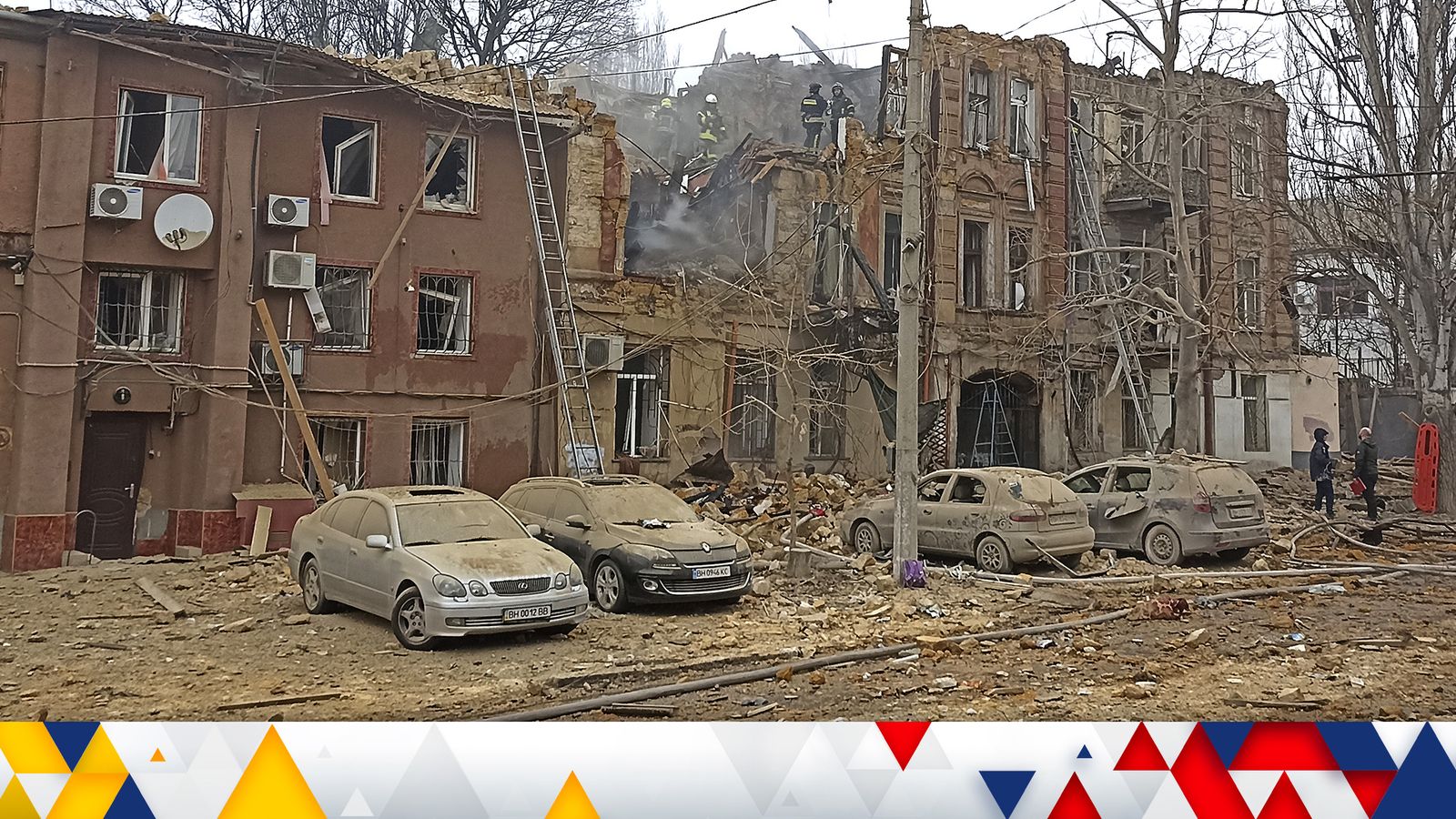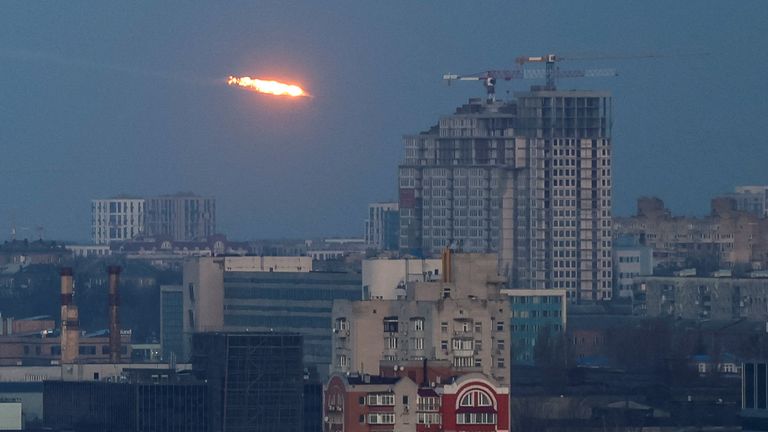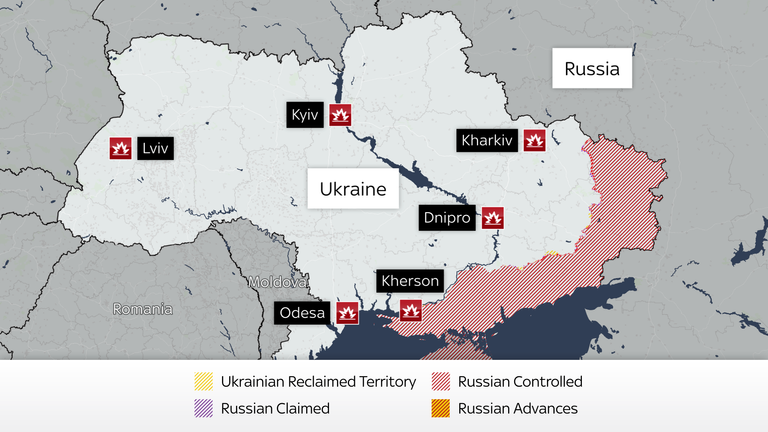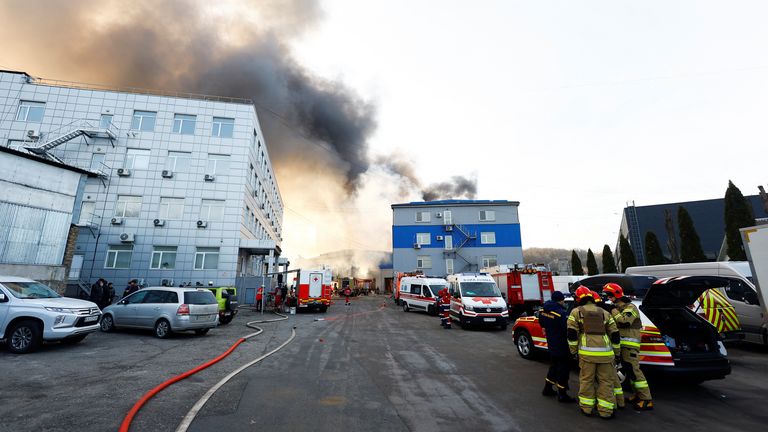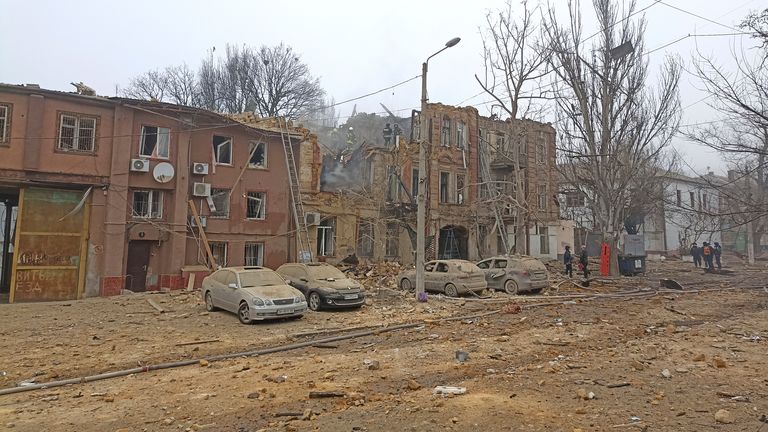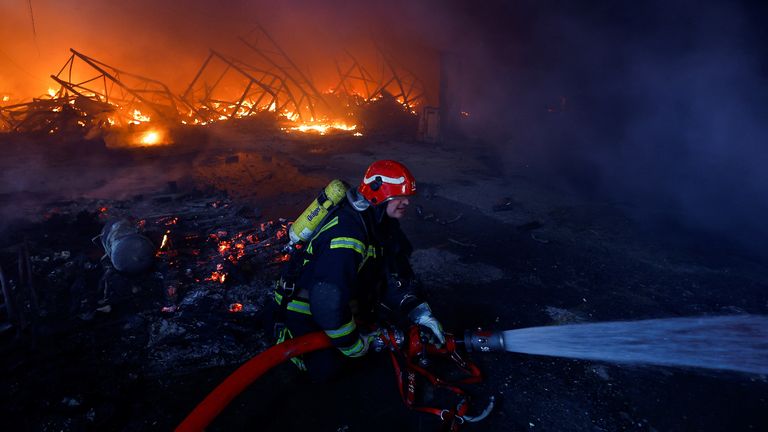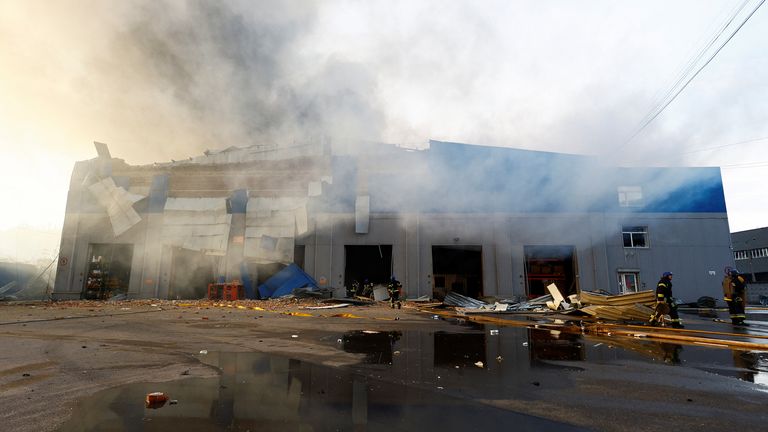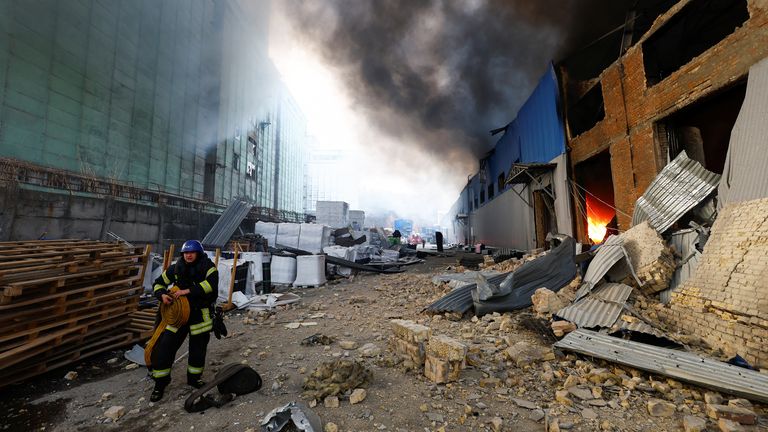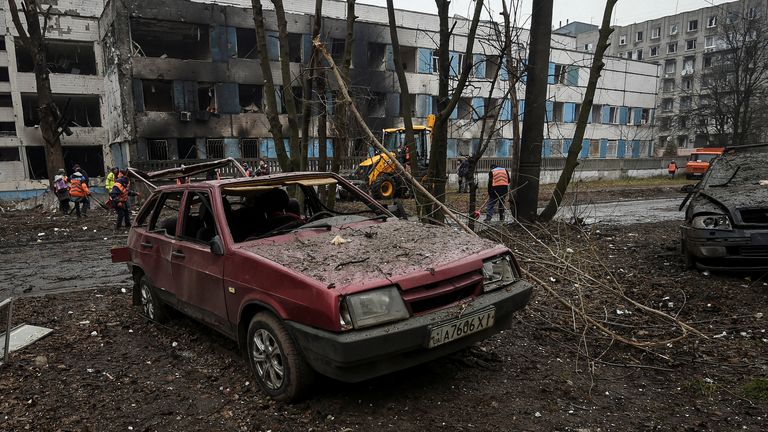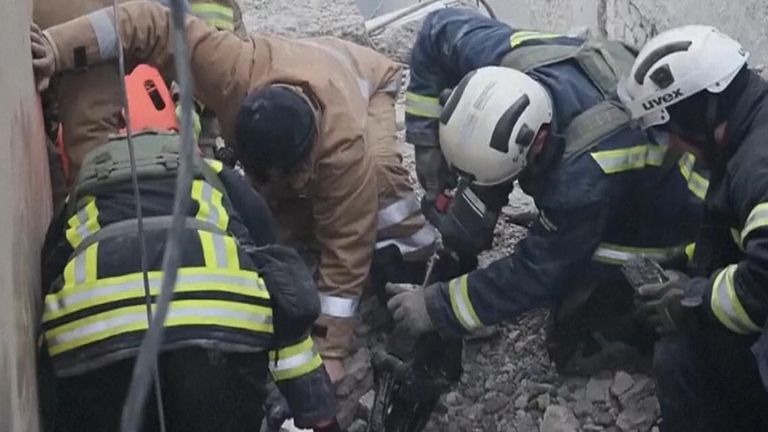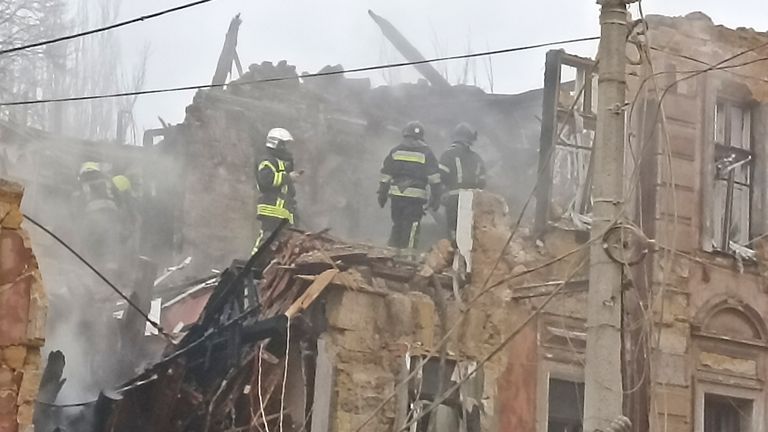Russia has launched one of its biggest aerial barrages on Ukraine since the start of the invasion, killing at least 30 people and wounding 144 others.
Several cities were struck overnight as Russia launched more than 100 missiles and dozens of drones, Ukrainian President Volodymyr Zelenskyy said, with most of them being shot down.
Ukrainian Air Force commander Mykola Oleshchuk suggested the strike was Russia’s largest aerial attack since the war began in February 2022, describing it on Telegram messenger as “the most massive attack from the air”.
Army chief General Valeriy Zaluzhnyi said the attack targeted critical infrastructure and industrial and military facilities.
Read more: Ukraine-Russia war latest
The Western military alliance says it is “monitoring the situation” in Poland after a suspected Russian missile entered its airspace briefly during the bombings.
The missile is thought to have flown over Polish territory for three minutes before moving back into Ukrainian airspace. Polish President Andrzej Duda has since convened an emergency meeting of the National Security Council.
Poland is a NATO member and would expect to be backed by other countries including the US and UK if it is attacked.
“I spoke with President Andrzej Duda about the missile incident in Poland,” said NATO secretary-general Jens Stoltenberg.
“NATO stands in solidarity with our valued ally, is monitoring the situation and we will remain in contact as the facts are established. NATO remains vigilant.”
Damage was reported at a maternity hospital in the central city of Dnipro and buildings in the western city of Lviv, the southeastern port of Odesa and city of Zaporizhzhia, and the eastern city of Kharkiv.
At least three people were killed in the capital Kyiv, with 10 people trapped under rubble at a warehouse damaged by falling debris, said the city’s mayor Vitali Klitschko.
In Boyarka, a city near Kyiv, the debris of a shot-down drone fell on a home and started a fire.
Andrii Korobka, 47, said his mother was sleeping next to the room where the wreckage landed and was taken to hospital suffering from shock.
“The war goes on, and it can happen to any house, even if you think yours will never be affected,” Mr Korobka said.
At least three other people were killed in the Black Sea port city of Odesa and at least 15 were injured, including two children, as missiles hit residential buildings, the regional governor for the area said.
At least five people were killed in Dnipro, where missiles hit a shopping centre, a privately-held home and a six-storey residential building, and at least two were also killed in Kharkiv and Lviv.
Three schools and a kindergarten were also damaged in Lviv, the city’s mayor Andrii Sadovyi said.
Missiles also hit several infrastructure facilities in the southeastern city of Zaporizhzhia, where at least one person was killed, the interior minister said.
“Today, millions of Ukrainians awoke to the loud sound of explosions. I wish those sounds of explosions in Ukraine could be heard all around the world,” foreign minister Dmytro Kuleba said, calling for Kyiv’s allies to step up their support.
Ukrainian Air Force spokesman Yurii Ihnat claimed Russia used hypersonic, cruise and ballistic missiles, including X-22 type, which are extremely hard to intercept.
“Russia attacked with everything it has in its arsenal,” President Zelenskyy said on Telegram.
The president initially reported that around 110 missiles were fired, “most of which were shot down”.
Ukraine later claimed Russia had launched 122 missiles and 36 drones, with the military managing to down 27 drones and 87 cruise missiles.
It comes days after Ukraine downed 32 of 46 Iranian-made drones deployed by Russia in an overnight air strike.
On Wednesday, Ukraine’s military said most of the rest of the drones hit the frontline, mainly in the Kherson region.
According to the Ukrainian air force, the previous biggest assault on the country was in November 2022, when Russia launched 96 missiles against Ukraine. This year, the biggest was 81 missiles on 9 March, air force records show.
Ukraine has been warning for weeks that Russia could be stockpiling missiles to launch a major air campaign targeting the energy system.
Last year, millions of people were plunged into darkness when Russian strikes pounded the power grid.
The energy ministry reported power outages in four regions after the air attack.
In the Lviv region, which borders Poland, impacts were confirmed at a critical infrastructure facility, the president’s office said, declining to say which one.
“The enemy targeted social and critical infrastructure,” Prime Minister Denys Shmyhal said.
The attack comes days after Ukraine struck a Russian warship in the occupied Crimean port of Feodosia.
It also follows a $250m (£196m) military aid package to Ukraine from the US, which included air defence ammunition.
General Sir Richard Barrons, former commander of Joint Forces Command, told Sky News the massive overnight assault was “relatively unusual”.
He said: “Since the invasion began, Russia has used about 11,000 missiles and drones. So, 110 is quite a large number for one night’s work.
“Russia can probably make about 65 cruise missiles a month now and it imports others from places like Iran, so it was a major effort. But then the sinking of the landing ship was a major disaster for the Russian military.”
General Barrons believes the bombings were a message to Ukraine that “Russia can hit anywhere in the country and it will focus on civilian targets”.
He added: “But also a message to Ukraine to keep their air defence around the cities and not on the frontlines.”
Click to subscribe to the Sky News Daily wherever you get your podcasts
Sky News’ military analyst Sean Bell said Russia could have launched the attacks to “make life as miserable as possible” for Ukrainians during the harsh winter months.
He added that the airstrikes may also have been in retribution for the landing ship attack.
Mr Bell said: “At the start of 2023 it would have been full of expectation. President Zelenskyy was being offered lots of weapons.
“He’d shown that he could push Russia out of Ukraine, but by the end of the year, frankly, the spring offensive really hasn’t achieved much.
“And at the year’s end, Russia is actually on the front foot at the moment.”
Mr Bell believes Ukraine’s future lies in Western support.
He added: “And bluntly, this last package of aid has just arrived, £200m. Unless the EU and the US unblock the aid that’s spare there, then Russia will become emboldened. President Putin will become much more resilient and robust about his offense.
“But it’s almost certainly not the end to 2023 that President Zelenskyy might have hoped for at the start of the year.”
This story originally appeared on Skynews

